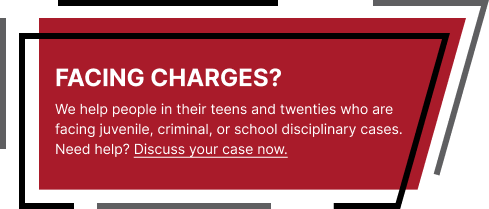

One of the largest milestones of a teenager’s life is earning the right to drive. In the excitement of getting their license, young drivers often test the limits of their new freedom. What often gets lost in the excitement is an acknowledgment of the penalties associated with “testing the limits,” like the speed limit. At this age, getting pulled over is likely to be a young driver’s first time interacting with a police officer in a traffic stop. It’s imperative to take the right steps during a traffic stop, and it’s even more important to take the right steps after receiving a ticket.
Even well-seasoned drivers can panic when they get pulled over. But people between 16 and 20 years old who have no idea what to do can unintentionally get themselves in trouble. Feeling nervous or angry is a natural reaction to traffic stops, but remaining as calm as possible will make the entire interaction easier. Stay in your car, have your license, and insurance ready to hand over, and be polite when you speak with the officer.
You might know the exact reason why you’ve been pulled over, but that doesn’t mean you should automatically admit fault. Respectfully answer any questions you want to answer that the police officer poses to you, but remember that anything you say to the officer can be used against you. You should not argue with the officer about the ticket you are given and accept whatever ticket you receive. The ticket will specify what you’re charged with. Generally, it will list your court date or provide instructions on how to obtain your court date.
Most teenagers and young adults assume paying the ticket is the easiest way to move on, but that’s not always the case. Depending on your infraction, points can be added to your license. If enough points build up or if you are convicted of an offense that carries an automatic suspension, your license can be suspended. Having your privilege to drive taken away can create hardships on both the individual and their family, as well as cause insurance impacts. Working with an attorney from Ghanouni Teen & Young Adult Defense Firm can help a young person avoid the severe consequences for traffic violations.
A suspension is given out when a driver accrues a certain number of points on their license. Different offenses lead to different point totals based on the driver’s age group. Anyone between 18 and 20 years old will have their license suspended for three reasons:
The most common single-ticket offenses that carry four or more points are:
Drivers who are 17 and under are at the greatest risk of having their license suspended. Not only do they face the same penalties as 18- to 20-year-olds, but instead of incurring suspension after accruing 15 points in a 24-month time period, they face suspension for accruing only four or more points in a 12-month period. We’ve compiled a comprehensive list of driving offenses and their point totals.
A Super Speeder, according to the Georgia Department of Public Safety, is a driver who has been convicted of speeding at 75 mph or more on a two-lane road, or 85 mph and above on any road or highway in Georgia. Even though additional points aren’t added on for the Super Speeder designation, these drivers face an added fine of $200, which will be in addition to any fines paid at court. If you’ve been charged as a Super Speeder, it’s important to reach out to an experienced attorney who can help you put your best foot forward.
The worst thing a young driver can do is pay the fine after getting a ticket without consulting an attorney first. An experienced attorney can often get points and fines reduced. Even if the offense is minor and carries only minimal points, another ticket in the future can push a point total over the maximum. If you’ve received a ticket or a notice of license suspension – especially if you are under 21 – contact us for a Defense Strategy Meeting.
Ghanouni Teen & Young Adult Defense Firm 691 John Wesley Dobbs Ave NE unit 225, Atlanta, GA 30312
Ghanouni Teen & Young Adult Defense Firm 2765 S Main St Suite C-2, Kennesaw, GA 30144
Ghanouni Teen & Young Adult Defense Firm 3826 Highlands Parkway SE, Smyrna, GA 30082
Ghanouni Teen & Young Adult Defense Firm 3227 S. Cherokee Lane, Suite 1360, Woodstock, GA 30188